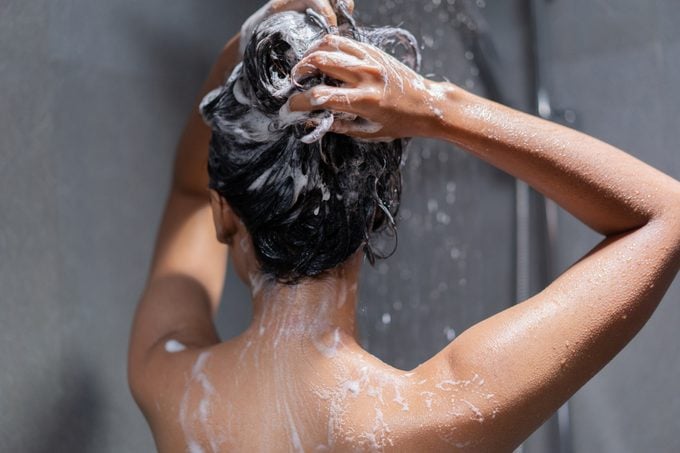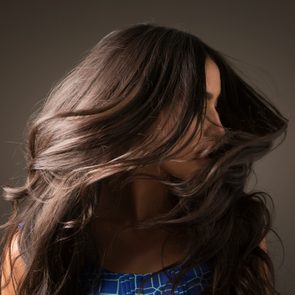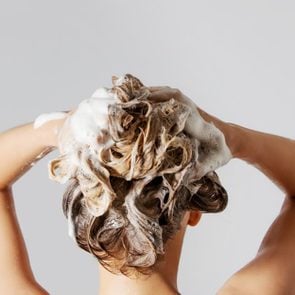Here’s How Often You Really Should Be Washing Your Hair
Updated: Dec. 06, 2022
Do you really know how often your hair needs to be washed? Experts say it depends on your hair type and texture—as well as lifestyle and environmental factors—and the overall health of your hair.
Our editors and experts handpick every product we feature. We may earn a commission from your purchases.
Washing your hair
According to Cleveland Clinic dermatologist Shilpi Khetarpal, MD, most people don’t need to wash their hair every day, and every other day—or even every second or third day—is sufficient. How often you wash your hair depends on a few factors, such as your hair type and texture, your lifestyle, how often you work out, and even where you live because things like pollution and humidity have an impact on your hair’s cleanliness.
How often (and how) you wash your hair affects both how your hair looks, and the health of your scalp. To have hair that looks its best, and a scalp that’s free from flakes, avoiding these healthy hair mistakes is a good place to start. For healthier hair that looks great from the follicles to the ends, pay close attention to your specific hair type’s needs.
Here are our tips for keeping your hair looking and feeling its best.
Epidemiologists’ Top 12 Gym Hygiene Rules Since the Pandemic
How often should you wash your hair?
According to Catalina Drouillard, hairstylist and owner of Three Sixteen Hair Haven in Kihei, HI, how often you should wash your hair depends on your hair type and texture—if you have an oily scalp or fine hair, you’re likely best off shampooing every day. Coarse or dry hair, meanwhile, may be better off only being washed once a week to prevent further damage.
“The more you do to your hair (coloring, highlighting, blow drying, curling, straightening, etc.), the less it should be washed,” advises Alisa Paganis, a hairstylist at Solo Salon in Chicago’s West Loop neighborhood. “Your wash schedule and suitable product choice should be discussed with a professional. In the meantime, less is more.”
Every other day or every three days is usually often enough for most types of hair. You may think you’re doing your locks a favor by washing as often as possible to help them stay extra clean, but “It’s possible to wash your hair too often and washing every day is too much for most people,” Drouillard says. “You could be shampooing too often if your hair feels dry and brittle, or it’s possible you may be using the wrong type of shampoo for your hair.”
“Daily hairwashing, even with quality products, is still too much washing and can dry your scalp and ends,” Paganis says. “When an ‘over the counter’ product is used every day, the scalp reacts and creates oil in an attempt to replace the natural oils just stripped from the hair, thus leaving the need for everyday washing. I recommend a quality salon product and scalp training to move away from washing your hair every day.”
I Tried Hairstory Nontoxic Shampoo—and I No Longer Need Conditioner
How to choose a shampoo and conditioner
It’s important to use shampoo and conditioner that is the right formulation for your hair—but that said, it’s easy to get overwhelmed with all of the shampoo and conditioner options lining the shelves. According to Drouillard, you can generally expect to get what you pay for with hair care, so it can be worth it to devote some extra cash to your hair care routine.
An increasing number of people avoid products made with preservatives known as parabens and foaming agents called sulfates, as both have been linked to health issues. The good news is that you can easily find shampoos and conditioners that don’t contain them at the drugstore or stores, where you can also get advice from the staff.
Choosing a shampoo and conditioner largely depends on your hair type and texture, Drouillard says. If you have color-treated, dry, damaged, or thin hair, you should look for products designed specifically for these characteristics as well as avoiding these habits that cause thinning hair. Drouillard recommends the Paul Mitchell Clean Beauty line, which is made of natural and sustainable vegan ingredients and offers options for dry, damaged, frizzy, and normal hair.
Drouillard strongly advises against using clarifying shampoos more than once a week. She also typically doesn’t recommend two-in-one shampoo and conditioner products, especially if you have an oily scalp.
Dry shampoo has become increasingly popular, but some stylists say it’s not something to rely on in place of hairwashing, although it’s a great tool to have when you don’t have time to wash, dry and style your hair. “You can use dry shampoo for several days in between washes, depending on the amount of natural oils you produce,” Paganis says, “But if it’s making your scalp itchy, dry or flaky, use a scalp exfoliant and take a day or two off of using dry shampoo.”
Shelly Streenz, owner and master stylist at Oh Baby Hair & Day Spa in Bloomington, IL, has a brilliant dry shampoo suggestion. “I tell my clients to use dry shampoo after styling on day one,” Streenz says, “It starts absorbing excess oil immediately, and you get an extra day of no shampooing!”
How much should you lather?
The saying “lather, rinse, repeat,” has been debated for decades. Is it really necessary, or is it just a ploy to get you to use up shampoo faster? Turns out, there is some truth to it.
According to Drouillard, if you’re not shampooing every day—or you’re shampooing after a sweaty workout—you should always lather up and rinse out your shampoo twice with each use.
I Slept on a Satin Pillowcase for Better Skin and Hair—Here’s What Happened
Should you use conditioner?
Once you’ve lathered up and rinsed out your shampoo, you should always follow it up with some conditioner, Drouillard says. If you don’t have oily hair, you can opt to just condition on days you don’t wash your hair to give your locks some added moisture.
“No matter what type of hair you have or how long your hair is, everyone should be using conditioner when they shampoo,” Drouillard says. “If having limp or fine hair makes you want to skip this step, the conditioner you’re using may be too heavy for your hair’s texture.”
When massaging in your conditioner, focus on applying it to the body of your hair, especially close to the ends. Drouillard recommends never putting conditioner on the scalp—it can lead to build up—and rinsing with cold water which helps close the cuticle and promote smoother, shinier hair.
“If you don’t already comb conditioner through your hair, you need to start now!” Paganis says. “After rinsing the shampoo, squeeze excess water from your hair, then pull it apart so that it is not all converged. Then, put conditioner from mid-strand to ends, and use a comb or detangling brush to distribute more evenly.” You can also try one of these stylist-approved hair masks for deeper conditioning.
After the wash
After you wash your hair, be gentle when towel drying, as your hair is weakest when wet. Rubbing your hair vigorously can cause breakage and it also roughs up the outermost layer of your hair—the cuticle—creating frizz.
Microfiber towel wraps are terrific for gently drying your hair. Drouillard recommends avoiding heat tools like blow dryers and air-drying whenever possible. If you must blow dry, use a heat-protectant styling product such as Paul Mitchell Neuro Prime HeatCTRL Blowout Primer or Aveda Brilliant Damage Control every time.
I Drank Vital Proteins Collagen Creamer for Better Skin—Here’s My Review
A word about dandruff or other conditions
Itchy scalps are not only uncomfortable, but it’s also embarrassing to see flakes on our clothes. If you have dry, flaky skin on your scalp, you might find relief from one of these dandruff shampoos, but if you have scalp psoriasis—a common, chronic skin condition caused by an overactive immune system—you should try one of these best shampoos for scalp psoriasis.
If you’re experiencing an itchy scalp and grease, you may have a very common skin disease called seborrheic dermatitis, points out Adele D. Haimovic, MD, a clinical associate professor of dermatology at New York University Langone Medical Center. Seborrheic dermatitis causes a red rash, scaly patches, and itchy skin. Although you may think it’s best to avoid disrupting your scalp, with this condition, dermatologists recommend shampooing more frequently and avoiding products containing harsh sulfates, she says.
If you’re experiencing any type of scalp irritation, it’s also important to be mindful of your technique. “Aggressive scrubbing can be detrimental, so make sure you’re gently massaging the shampoo into your scalp with your fingertips and not your nails,” Dr. Haimovic says.
Finally, if you’re experiencing persistent itching or irritation, persistent hair loss, or significant hair thinning, Dr. Haimovic recommends seeing a dermatologist to rule out other underlying conditions or to potentially try a prescription remedy.
- Feeling Thankful Can Help Prevent These 7 Major Diseases, Says Research
- Eating This Nut Will Help Your Gut and Reduce Inflammation, New Study Says
- Everyday Habits That Reduce Your Risk of Dementia
- 8 Healing Plants You Can Grow at Home
Additional research and reporting done by Jaime Stathis

















